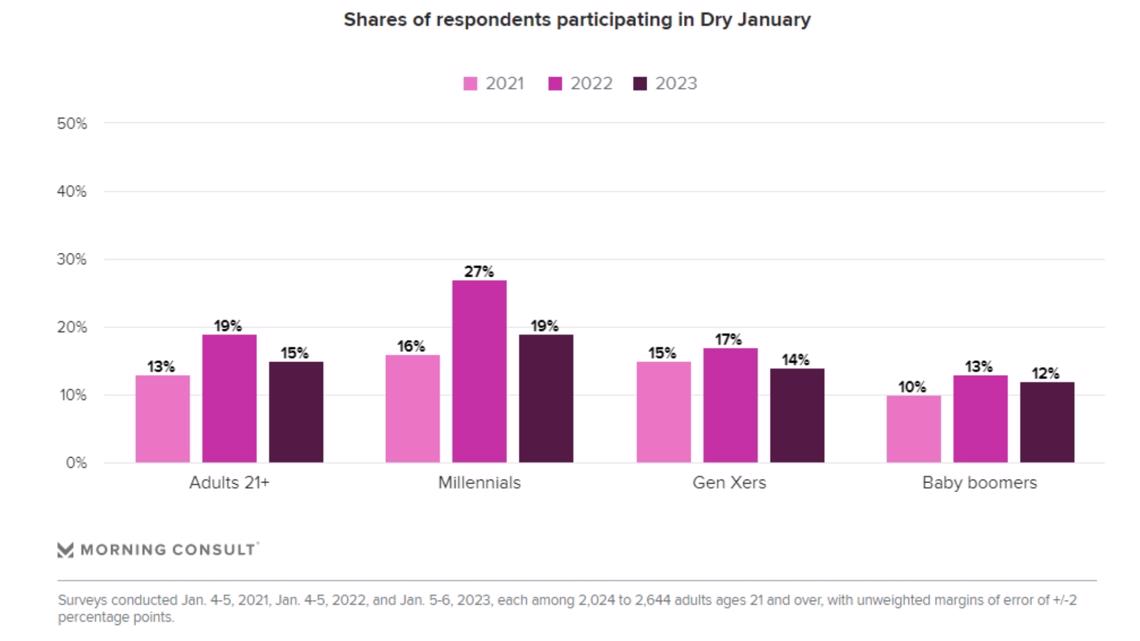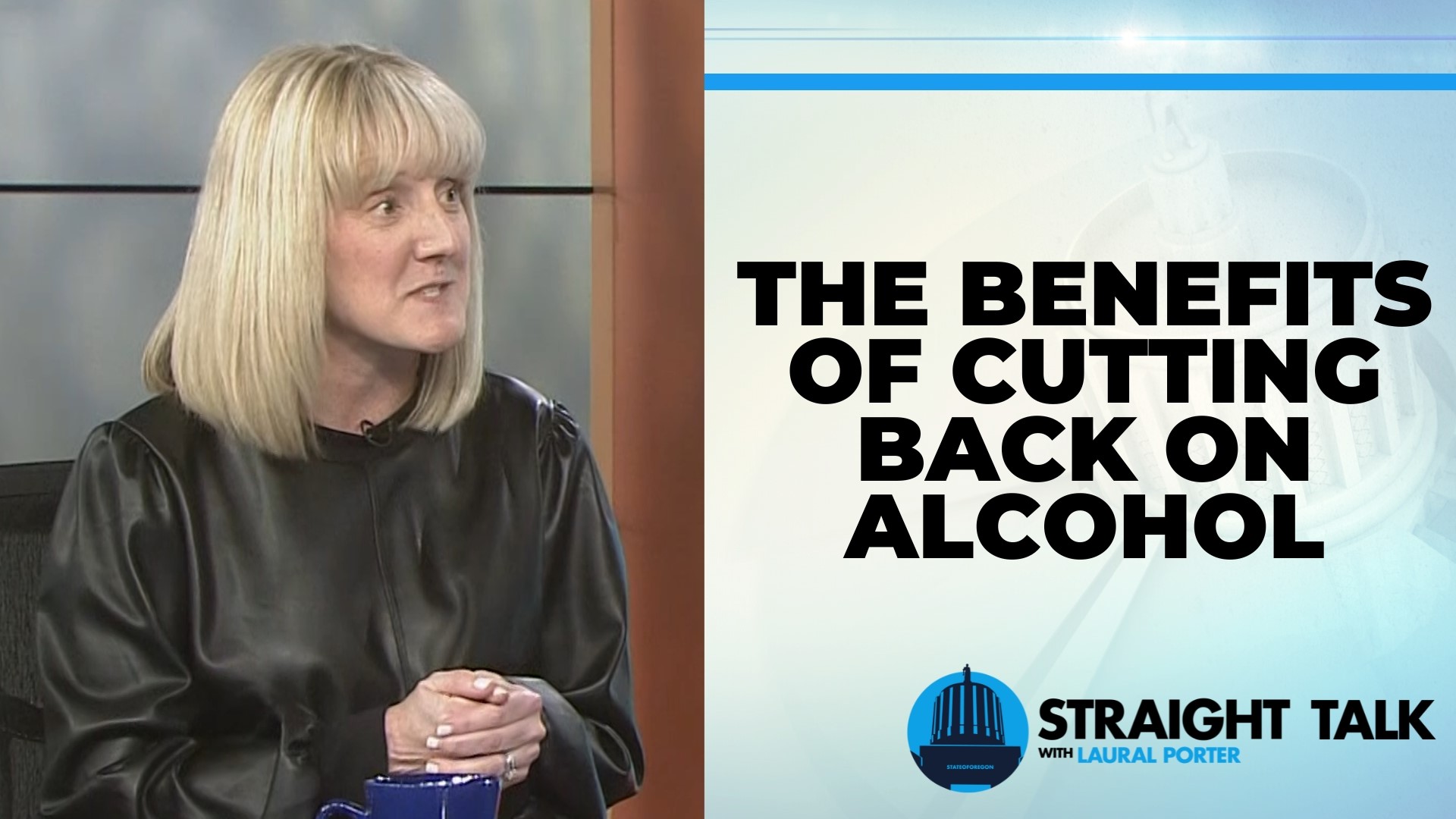PORTLAND, Ore. — The last few years have been, putting it mildly, a whole lot. We're in the throes of a global pandemic, soon to enter its third year, dealing the school and work disruptions that came out of it, rising prices on everything from housing to gas to food to energy, and intense societal issues ranging from homelessness to gun violence to a mental health crisis, it's perhaps understandable to reach for a glass of wine or beer at the end of a long day. Or two, or three. But when does it become too much?
In recent years, thousands of people start off the new year by abstaining. "Dry January" was conceived as a response to the over-indulgence of the holiday season, and to start off the new year with a more mindful approach to drinking. But last year, the number of people participating in Dry January fell across all age groups. A poll by Morning Consult shows that 19% of adults 21 and over gave up drinking in 2022, but only 15% of them quit in 2023.


There could be both positive and negative reasons behind that drop, according to Heidi Wallace, the president of Hazelden Betty Ford's northwest region. The obvious being stress.
"Stress is a huge indicator of increased use," Wallace said. But, she said, it also could be that people are adding more sober months into their year at other times. "We're hearing about 'Dry July' and 'Sober October.'"
Any time is a good time to take on a short-term sobriety challenge, Wallace said. It allows you to take a look at your relationship with alcohol and the impact it has on your life, and to consider how sobriety feels and what benefits it may bring.
"Dry January really gave that 'sober curious' movement a start. I think more and more people, when they did Dry January, realized that there were so many benefits, not just to their health but maybe financially," said Carrie Bates, an Olympic gold medalist in recovery from alcohol addiction. "Maybe alcohol was starting to cause problems with co-workers or family members. And those maybe went away during Dry January. So really it's just allowed people, without stigma, to start taking intermittent breaks from drinking to really do some kind of self-evaluation."
There are a myriad of health reasons to reduce alcohol consumption. The Centers for Disease Control reports that nearly 22,000 Americans die annually from alcohol-related liver disease. Nearly 25% of them are younger, people in their twenties, thirties, or forties, and women are especially susceptible, both because of body composition and social stigma against getting treatment. The CDC also reports that more than 140,000 people die from excessive alcohol use in the U.S. each year, and those numbers have risen during the pandemic.
"The opioid crisis is one thing that we hear a lot about, and it's very much been a problem. But what gets forgotten when we focus on one drug, is that there's actually a substance that's been killing people more over time. And that's alcohol," Wallace said.
Even small amounts of alcohol can cause health problems over time, despite widely-touted research that alcohol can be beneficial. The studies claiming things like "red wine is good for your heart" were small, and conducted decades ago, said Wallace.
"There's actually far more research that shows that there isn't any amount that's healthy," Wallace said.
So how do you know when your drinking has become a problem? It's when hitting the town on the weekends starts to spill over into the rest of your life. Family or friends might mention something they've noticed, or you might start to have consequences at work or other obligations. And there's a simple question to ask yourself, Wallace said: "Did I drink? Can I stop? If I can't stop, then there's some problems there."
Carrie Bates said she hit bottom from alcohol addiction in her forties, decades after winning three Olympic gold medals in swimming and a successful career with Nike.
"It just completely destroyed my life," she said about her addiction. "I started losing my grip on what really mattered in my life — from my marriage to my career and really ultimately, my children."
She said she primarily drank wine, and quite a lot of it.
"It took really everything away from me that I knew and loved," she said. "I hit a bottom that some people never get to. And I pray that people don't have to get to the bottom that I did. But there is hope for recovery."
Bates went into treatment several times before she got sober in 2012.
It's not necessarily about giving up alcohol altogether, Wallace said, but about being mindful about alcohol consumption and its health risks.
"There's risk factors to look at, and important for people to know themselves and know what those risk factors are and go from there," she said.
If you do need help with alcohol addiction, treatment is available at Hazelden Betty Ford. The nonprofit has campuses in Newberg and Beaverton, programs can be tailored to your needs, and they are covered by health insurance. You can call 1-800-I-DO-CARE or visit HazeldenBettyFord.org.
Straight Talk airs Friday at 7pm, Saturday and Sunday at 6:30pm. Straight Talk is also available as a podcast.
VIDEO PLAYLIST: Straight Talk

